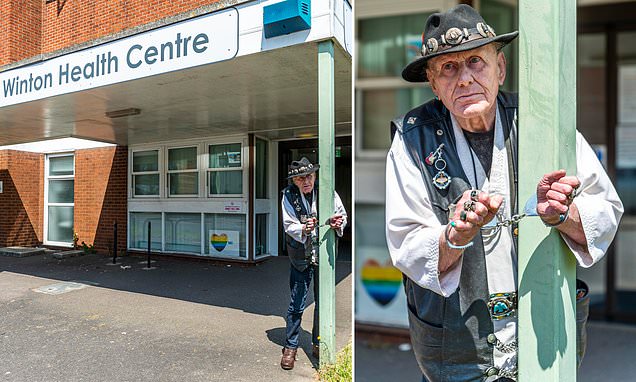Retired doctor HANDCUFFS himself to pillar outside GP surgery in desperate attempt to save it from closing
- Winton Health Centre in Bournemouth will close its doors for good on July 31
- It said financial problems and recruitment issues had forced the closure
- Dr Edwin Owen chained himself to the surgery’s pillar ‘as a final last stand’
A retired doctor handcuffed himself to his GP surgery in protest over its looming closure.
Dr Edwin Owen, who chained himself to a pillar outside the Winton Health Centre, Bournemouth last week, said: ‘I just wanted to take a final last stand to show that not everybody had given up on the surgery.
‘The fight is only over when it has closed down, I hope there’s some way this can be turned around.’
Dr Owen, who worked as a psychologist, said the closure was a ‘disaster’ and locals were ‘disgusted’ by the decision.
Approximately 10,000 patients will have to change their GP practice when it shut its doors on July 31.

Dr Edwin Owen (pictured), who retired 12 and a half years ago said: ‘I never wanted to end up chained outside my surgery. ‘The whole situation has been a disaster and I wish I hadn’t needed to protest the closure like I did

It is understood Dr Owen stood chained to the pillar for around an hour. ‘The fight is only over when it has closed down, I hope there is some way this can be turned around’, he said

Dr Owen had hoped the area’s Tory MP Conor Burns – who was last week put forward for knighthood in Boris Johnson’s resignation honours list – ‘might have had enough influence with the Minister for Health to get something done’

Dr Owen added: ‘I have spoken to a lot of local residents and everyone is disgusted by the decision. As it is, I think people need to make their voices heard. I feel bloody angry about the whole thing’
Local health bosses, who are in charge of the practice, said it was down to financial difficulties and ongoing recruitment issues.
The surgery, in a suburb close to the town’s university, has five GPs on its books. But data suggests not all of these work full-time.
Doctors at Winton Health Centre were having to deliver up to 375 appointments per week — more than double the BMA’s safe limit.
All of the patients will be reallocated to nearby surgeries.
What has the Government promised to try and help ease pressure on GPs?
Under the ‘Primary Care Recovery Plan’ published in May, ministers hope pressure will be eased on the NHS and ‘mean that people can get access to the health care they need quicker’.
Its measures include:
- Investing £240million in new phone systems to cut waiting times for patients seeking appointments.
- Spending £385million to hire 26,000 direct patient care staff to deliver more than 50million appointments by March 2024.
- New freedoms to allow some patients to access NHS services like physiotherapy and hearing tests without a GP referral.
- Allowing half a million women to obtain contraceptive pills from their pharmacist without speaking to a GP or practice nurse.
- Expanding the NHS app to allow most patients to access their health records and test results online.
- Boost GP speciality training, make it easier for GPs who require a visa to stay in England and encourage experienced GPs to stay in the NHS.
- Ordering officials to devise a system to allow fit notes to be issued by text and email.
- More than doubling the number of blood pressure checks carried out in pharmacies.
The long-awaited NHS workforce plan, which could come within weeks, is also expected to promise to boost GP training places.
Under drastic new proposals revealed this month – but yet to be confirmed – specialty and specialist (SAS) medics could also be drafted into GP practices across the country.
Such doctors have not undergone the highest level of training, and don’t reach the level of consultant.
But health bosses hope the plan will help slash GP waiting times and create millions of appointments.
Fifteen members of staff are expected to be left out of work.
Dr Owen, who retired from his role 12-and-a-half years ago, said: ‘I never wanted to end up chained outside my surgery.
‘The whole situation has been a disaster and I wish I had not needed to protest the closure like I did.’
It is understood that he stood chained to the pillar for around an hour.
Dr Owen had hoped the area’s Tory MP Conor Burns, who was last week put forward for a knighthood in Boris Johnson’s resignation honours list, ‘might have had enough influence with the minister for health to get something done’.
He added: ‘I have spoken to a lot of local residents and everyone is disgusted by the decision.
‘As it is, I think people need to make their voices heard. I feel bloody angry about the whole thing.
‘They should feel that they have a moral obligation to the people of Winton to help them.’
Dr Owen said: ‘I look ahead and it just looks like the whole health system is failing. It will all be privatised soon.’
In a letter to patients last month, GP partners at Winton Health Centre said they have made the ‘difficult decision’ to end their NHS contract.
Most GP surgeries are ran as private businesses and contracted by the health service to care for patients.
Poole Bay and Bournemouth Primary Care Network, which commissions the surgery, claimed ‘unsustainable’ workforce pressures, difficulties recruiting and ‘insufficient’ funding had forced the practice to close.
Ian Gray, manager of Poole Bay and Bournemouth PCN, said: ‘There are issues with the way GP practices are funded, in that the formula is based on number of patients, not necessarily the demographics of those patients.
‘So areas with high numbers of elderly patients who have more health needs won’t necessarily get more funding.
‘There has been a slow build up of factors which led to the decision to close the surgery.
‘We haven’t had enough funding, the building is not fit for purpose and recruitment has been hard.’
He added: ‘It is just unsustainable to have GPs seeing so many patients a day. From a workforce perspective there was rightful concern over burn-out.’
Hundreds of GP surgeries have had to shut over the past decade because of similar issues, with analysts saying another 7,000 family doctors are needed to plug gaps in rotas.
Some have closed completely, leaving patients with no option but to travel further afield. Others have merged, creating ‘mega-surgeries’.
Closures have only pushed list sizes up further, making it even harder for patients to get appointments.
Ministers have silently binned a promise to hire 6,000 more GPs, which was a major part of Boris Johnson’s election-winning manifesto. Just 2,000 more family doctors have been recruited since 2019.

In a letter to patients last month, GP partners at Winton Health Centre (pictured) said they have made the ‘difficult decision’ to end their NHS contract on 31 July. Poole Bay & Bournemouth Primary Care Network (PCN), which commissions the surgery, said ‘unsustainable’ workforce pressures, difficulties recruiting and ‘insufficient’ funding had forced the practice to close

Graph shows the ratio of GP patients to practices since 2015, with an average of 9,755 patients per surgery in May 2023. Proposals to address rocketing GP demand and chronic staff shortages are expected in the Government’s long-awaited NHS workforce plan. But the document, which was widely anticipated to be published last month, appears to have again been delayed over funding concerns

GPs say their surgeries are overwhelmed due to the pressures of the rising and ageing population, a lack of government funding and a shortage of doctors. NHS statistics show there were 27,231 full-time equivalent fully qualified GPs working in the NHS in England, as of April 2023. Full time equivalent terms equate to 37.5 hours a week
But the number of fully qualified GPs, working the full-time equivalent of 37.5 hours on average a week, has shrunk to around 27,300, data shows.
Many are retiring in their 50s, moving abroad or leaving to work in the private sector because of soaring demand, paperwork and aggressive media coverage of the NHS.
Professor Kamila Hawthorne, chair of the Royal College of GPs (RCGP), said that GPs across Britain were facing a ‘fundamental crisis’.
Read more: The surgeries where 20,000+ patients compete to see ONE doctor: England’s most overstretched GP practices REVEALED in an interactive map… so how does YOURS fare?

She said: ‘The loss of a GP practice in any area will have a stark impact on the community.
‘Sadly, instances of practice closures are becoming all too common.
‘Our own data shows that more than a quarter of practices are warning they could be forced to close, with almost 90 per cent citing unmanageable workload pressures as a reason.
‘GPs are facing a fundamental crisis. We fear more practice closures will be inevitable.’
Proposals to address rocketing GP demand and chronic staff shortages are expected in the Government’s long-awaited NHS workforce plan.
But the document, which was widely anticipated to be published last month, appears to have been delayed over funding concerns.
It comes as the Government unveiled its GP ‘recovery plan’ last month, which aims to ease pressure on GPs and hands new prescription powers to pharmacists.
Under the plan, £240million will be invested in new GP phone systems to cut waiting times for patients seeking appointments and spending £385million to hire 26,000 direct patient care staff.
It will also enable pharmacists to prescribe drugs for conditions including ear infections, sore throats, sinusitis, shingles and minor urine infections.
Under drastic new proposals revealed last month – but yet to be confirmed – specialty and specialist (SAS) medics could also be drafted into GP practices across the country.
Such doctors have not undergone the highest level of training, and do not reach the level of consultant.
But health bosses hope the plan will help slash GP waiting times and create millions of appointments.
Source: Read Full Article



